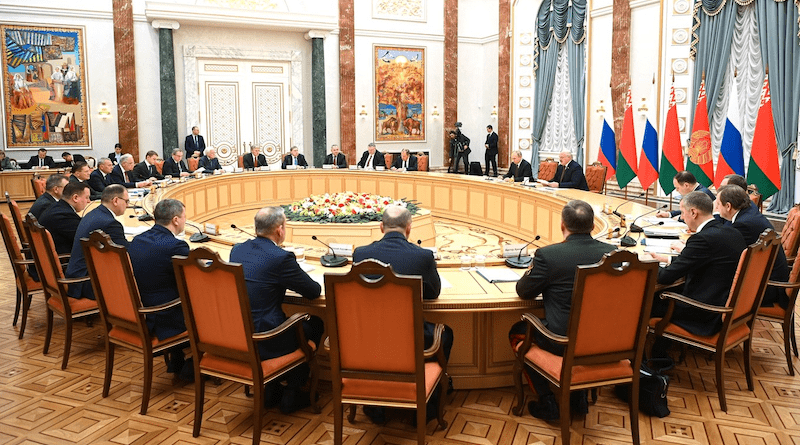Russia-Belarus Developments Hint At Hot Start To 2023 – OpEd
By Arab News
By Dr. Diana Galeeva *
Russian President Vladimir Putin has made his first visit to Belarus in three and a half years. Experts have offered two possible scenarios and reasons for this visit. With the year’s end approaching, dividends are being calculated and plans for the coming year are being formed. In addition, one may see its symbolic value.
The visit took place the week after Russia celebrated its Constitution Day, thereby highlighting the strong and positive Russia-Belarus links. This angle has been highlighted by the American analysts at the Institute for the Study of War. Another possible motive is an attempt to bring Belarus more actively into the campaign against Ukraine. In this scenario, Ukraine expects a new offensive from the north.
Ahead of the talks, the press office of Belarusian President Alexander Lukashenko stated that the leaders would hold one-on-one talks, as well as wider negotiations with their ministers, and that the issues of security, economic collaboration and shared challenges would be discussed. The Kremlin also confirmed that negotiations would be held with a focus on integrated engagement with the former Soviet state, as well as topics on the current international and regional agenda. However, Moscow rejected the idea that Putin visited Belarus in the hope of pushing Minsk into a more active role in the Ukraine conflict.
The last time the two leaders spoke was over the phone on Dec. 2, when they discussed bilateral relations, including collaborations in science. Nonetheless, it seems that security matters are the priority in ongoing bilateral relations. After the Dec. 2 talks, Russian Defense Minister Sergei Shoigu traveled to Minsk and signed an agreement on regional security and defense together with his Belarusian counterpart.
Based on Western reports and views expressed in Ukraine, the Russian army has been gradually shifting troops to its neighbor’s territory as it develops its presence in Belarus. Lukashenko has repeatedly stated that his country has no intention of sending troops into Ukraine. However, Belarus has also shown itself to be one of the most “loyal” former Soviet states. Whether it ultimately joins the Russian Federation or not, from Moscow’s point of view it has been a loyal ally and it can be counted on to offer its military assistance, either directly or indirectly.
A further, wider significance of Putin’s visit is that it occurred at a time when Moscow has been undertaking joint military exercises with both Belarus and China. Over the next week, Russian warships will be involved in joint naval drills with China. The Marshal Shaposhnikov destroyer, the Varyag missile cruiser and two corvette-class ships of Russia’s Pacific Fleet are expected to participate in the maneuvers on the East China Sea. China will deploy a few surface warships and a submarine for the exercise.
In recent years, there have been reports of a growing risk of drawing the US into conflict with China over the East China Sea, which — among other points of tension — is the subject of maritime disputes between China and Japan. This joint exercise seems to be a further statement of an intended challenge to the existing world order, which is dominated primarily by the West.
It is also not an isolated gesture. Just a brief look at global developments reveals many other examples. Ukraine’s president recently asked Western leaders (allies dominated by the US) for more funding, military training and the delivery of air defense systems and other weaponry at a meeting in Latvia. Meanwhile, EU ministers are in the process of finalizing a long-awaited deal to introduce a natural gas price cap that has already divided Europe. Hungary insists it should not need the bloc’s approval for Russian gas contracts, while the German gas lobby Zukunft Gas claims that the price cap is a “political illusion” and will not take place in practice.
Meanwhile, the Kremlin has stated that it is still considering what measures it will put in place in response to the G7 price cap on Russia’s oil exports. And, last month, China complained that a US warship had violated its maritime border and attempted to enter its territory without permission. All such reports were rejected by the US. This incident happened as US President Joe Biden and China’s Xi Jinping were meeting during the G20 summit.
While none of these points of confrontation are pivotal in themselves, together they tell of a story of Russia’s efforts to collect and hold on to allies on different global fronts, including in Europe and Asia, in addition to preserving forces in other places, such as the Middle East and North Africa region. Fluctuating collaborations and alliances are a vital part of ongoing efforts to challenge the existing world order, through a mixture of provocation, rhetoric and encouraging splits in others’ relationships.
With this long-term narrative in mind, for an analyst — especially as the end of the year is traditionally a time to consider the year’s outcomes and expectations — it has become quite possible that we will witness new confrontations in 2023. Where East confronts West for world dominance, friction can create sparks. This is particularly so when Russia’s strategy for an alternative to the current global status quo depends partly on fanning such sparks into flame.
• Dr. Diana Galeeva was an academic visitor to St. Antony’s College, Oxford University (2019-2022). She is the author of two books: “Qatar: The Practice of Rented Power” (Routledge, 2022) and “Russia and the GCC: The Case of Tatarstan’s Paradiplomacy” (I.B. Tauris/Bloomsbury, 2023). She is also a co-editor of the collection “Post-Brexit Europe and UK: Policy Challenges Towards Iran and the GCC States” (Palgrave Macmillan, 2021). Twitter: @diana_galeeva

